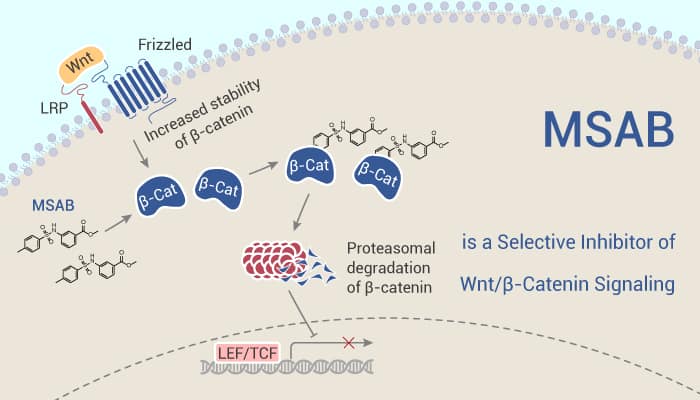Wnt/β-catenin signaling regulates key cellular functions including proliferation, differentiation, migration, apoptosis, and stem cell renewal. The β-catenin is a core component of the cadherin protein complex, whose stabilization is essential for the activation of Wnt/β-catenin signaling. In this study, researchers screen for small molecule compounds that act against Wnt/β-catenin signaling and identify MSAB as a selective inhibitor of Wnt/β-catenin signaling.

MSAB shows potent anti-tumor effects selectively on Wnt-dependent cancer cells in vitro and in mouse cancer models. Moreover, MSAB binds to β-catenin promoting its degradation and specifically downregulates Wnt/β-catenin target genes. In addition, MSAB selectively exerts anti-proliferative effects on Wnt-dependent cancer cells. MSAB stimulates the degradation of β-catenin, thus lowering the high level of active β-catenin and suppressing its nuclear translocation. MSAB treatment of HCT116 human colon cancer cells results in strong inhibition of the TOP-Luc activity in a dose-dependent manner. As a result, MSAB inhibits the proliferation of Wnt-dependent cancer cell lines. Furthermore, MSAB disrupts β-catenin activity by prompting proteasomal degradation of β-catenin.
MSAB inhibits the growth of Wnt-dependent xenograft tumors and shows a moderate bioavailability level at 30.5% absorption. MSAB markedly reduces the size and weight of various types of Wnt-dependent HCT116, HT115, and H23 tumors in xenografted mouse models. Moreover, western blot analysis shows an increase in the level of cleaved caspase 3 in HCT116 and H23 xenograft tumor tissues from mice treated with MSAB. MSAB treatment results in apoptotic cell death of tumor xenograft cells leading to a subsequent reduction in tumor size.
Together, MSAB increases ubiquitination and proteasome-dependent degradation of β-catenin, which leads to its inhibitory effect on the Wnt/β-catenin signaling pathway.